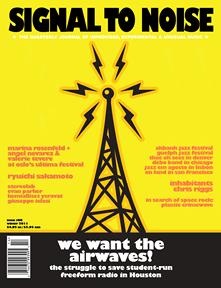October 11, 2011 is College Radio Day, “a loosely organized event that encourages participating radio stations to tout their unique role in training students and helping unknown bands find an audience” [USA Today: Budget cuts could silence college radio stations]. Click here for more information.
Media coverage
NonAlignment Pact: On Online Activism
I’m here to accept this award on behalf the KTRU alumni who founded and operate SaveKTRU.org. I don’t think it would be inaccurate to say that they’re very happy to be recognized for their online activism. Yet, it seems to me that the idea of “online activism” is, today, redundant, because the speed and scope with which the internet allows people who want something to connect with each other and disseminate information make it a fundamental component of modern activism itself.
For evidence of this, we need look only as far as the Houston Press itself, whose music editor, Chris Gray, arguably kicked off the Save KTRU movement by breaking the news of the impending sale in a Monday afternoon blog post, nullifying the embargo that the Houston Chronicle had negotiated with Rice to hold news of the impending sale until after it had been approved by the UH board, and in the process coming close to wrecking the deal itself by alerting the public to the meeting at which UH voted on the purchase. If the news had broken just one day earlier, it’s entirely possible that KTRU supporters would have been able to muster enough attendance at the UH board meeting to swing the vote away from the purchase.
Because activism is an inherently social activity, as SaveKTRU is recognized, in turn it should recognize the contributions of other sites which aided in the effort to stop the sale. In addition to the Houston Press (especially the work of Gray, Craig Hlavaty and Marc Brubaker), this includes Spacecityrock.com (which deserves a special Houston Press Web Award for Lifetime Achievement), culturemap.com, the Texas Watchdog, 29-95.com (which, ironically, is owned by the Houston Chronicle), Burn Down Blog, Radio Survivor and probably many other sites that aren’t coming to mind at the moment. Even more important are the many, many individual KTRU supporters who wrote or signed letters or e-mails, made comments, posted on Facebook or Twitter, or simply argued with people online or in real life about the sale of the station. The action of individuals working toward a common goal is the substance of activism.
It’s true that SaveKTRU was not successful in its campaign to stop the sale of KTRU’s license and FM transmitter. However, the way in which people who were touched by this campaign will remember the sale is defined not by the press releases of an educational corporation, but by the voices of friends, neighbors and members of the community. In capitalizing on the ecology of the web to fight the battle over that definition, to expose the venality, apathy, arbitrariness and bad faith that drove the sale of the station by harnessing the voices of the community, SaveKTRU can consider itself significantly more successful. Perhaps we can take some consolation in that.
You can read the full post here.
SaveKTRU.org wins Houston Web Award

Houston Press has named SaveKTRU.org the “Best Local Activism Site” in its first Houston Web Awards:
Despite ultimately losing the battle to keep KTRU’s alternative format and Rice campus location, the people behind the movement were organized and their Web site was a well-oiled extension of their effort
Read the full story here.
FCC Issues Letter of Inquiry into Proposed KUSF Sale
The letter requests both USF [University of San Francisco] and CPRN [Classical Public Radio Network] to provide extensive information about their working relationship and about the terms of the deal and PSOA [Public Service Operating Agreement]. It also points to some areas where FCC violations may be occurring. Specifically, it would appear that the FCC is concerned about USF’s loss of control of its broadcast studio (an issue which was raised in a letter to the FCC from Friends of KUSF in support of their Petition to Deny the license sale), has questions about the educational purpose of CPRN’s programming, and is curious to gain more information about whether or not CPRN is authorized to fundraise for itself over a station licensed to another entity.
Read the entire Radio Survivor article here, and the full FCC letter here.
MetaFilter: KTRU Departs FM Airwaves Defiant, Unique As Ever
2 weeks ago The FCC Approved controversial sale of Rice University’s radio station, KTRU, to the University of Houston and after 40 years of student-run broadcasting, KTRU’s FM signal was cut off promptly at 6 a.m. yesterday, leaving a sizable hole in Houston’s FM band.
Read the full post and comments here.
Houston Press: KTRU Departs FM Airwaves Defiant, Unique As Ever
Rocks Off had arrived at the station at approximately 4:30 a.m. to sit in on the final moments of its storied FM history. It was a bittersweet atmosphere, part revelry and part funeral; in part the introspective reflection of a wake and part triumphant march to the finish. The station was abuzz with several DJs, frantically trying to play everything they could.
After 40 years of student-run broadcasting, KTRU’s FM signal was cut off promptly at 6 a.m. this morning, leaving a sizable hole in Houston’s FM band.
Texas Watchdog: KTRU broker cost UH $200K; deal inked within months of UH furloughs, other cuts
The University of Houston agreed to pay $200,000 plus expenses to the non-profit firm Public Radio Capital for serving as a broker in the $9.5 million deal to acquire Rice University’s student radio station KTRU, according to a contract for the deal obtained by Texas Watchdog.
The deal securing Public Radio Capital was finalized in June 2009, with the purchase approved last August — all within months of the U of H instituting furloughs, a hiring freeze and pay freeze as the state struggled with declining revenue and projected budget shortfalls.
The e-mails show that U of H continued to pursue the KTRU deal even though some donors to its public radio station felt the purchase was unsound.
One donor, whose name was withheld, e-mailed Grover Campbell, VP of government relations at U of H, and referred to a report that found classical programming would lose money. KTRU was meant to complement U of H’s NPR affiliate KUHF; the university planned to use the additional frequency to broadcast classical music around the clock and turn KUHF into an all-news channel.
“I did speak with Ed and he basically confirmed what was in the report – classical is expected to lose $1M/year for the university plus the cost of acquisition and financing,” the donor wrote. “Hard for me to understand how to justify that for a university that is laying people off.”
You can read the full article here.
You can read the contract here.
Texas Watchdog: University of Houston must disclose payment info
The state Attorney General has ruled that the University of Houston must turn over certain business records relating to the sale of Rice University’s radio station KTRU to U of H, including the amount paid to a third-party consultant.
U of H asked the AG’s office for a ruling on some of the correspondence and payment information we requested.
The Jan. 7 ruling dictates that U of H can’t withhold communications with or payment to Public Radio Capital (PRC), a nonprofit consultancy that brokered the sale. The ruling did allow that some information being appealed by U of H met the standards for withholding, but much did not
Read the full article here.
Read the Attorney General’s ruling here.
Free Press Houston: 2010 Worst of Houston
Worst Attack on a Vital Houston Resource: Rice University
Kudos on using secrecy and deception to educate your students on Rice’s “unconventional” values.
Worst Betrayal of Public Trust by the Media: Houston Chronicle
But because Rice and UH were able to delay public disclosure of the deal, the two universities were able to gain an early advantage over opponents among Rice students, alumni, and the Houston community at large. So much the better for Rice and UH; so much the worse for Houston and the Chronicle’s reputation.
Signal to Noise: The Struggle to Save Student-Run Freeform Radio in Houston
The current issue of Signal to Noise magazine features an extensive cover story on the fight to save KTRU, entitled “We Want the Airwaves! The Struggle to Save Student-Run Freeform Radio in Houston“.
Find out where to obtain a copy here.
Radio: FCC’s Copps Proposes Public Value Test for License Renewal
Local and Independent Programming
The goal here is more localism in our program diet, more local news and information, and a lot less streamed-in homogenization and monotonous nationalized music at the expense of local and regional talent. Homogenized music and entertainment from huge conglomerates constrains creativity, suppresses local talent, and detracts from the great tapestry of our nation’s cultural diversity.
New York Times: Waning Support for College Radio Sets Off a Debate
… Mr. Yang believes the loss of a terrestrial signal will effectively delegitimize KTRU.
“As a 50,000-watt station that can be heard all across Houston, there’s a sense of responsibility to the community,” he said. “When you lose a terrestrial footprint in Houston — anyone can put out a signal that’s on the Internet — it takes away the legitimacy of what we’re trying to do.”
Despite obvious parallels between KTRU and WRVU, Chris Carroll, director of student media at Vanderbilt Student Communications, draws a stark contrast between the situations at the two universities. At Vanderbilt, he said, “what’s happening, really, is a big public discussion about is this a good idea or not, and there’s no conclusion to that yet.” Rice, he said, made the decision to sell KTRU behind closed doors — without student input.
After a tumultuous summer, groups focused on saving the stations have mobilized at both campuses. Both have Web sites — savektru.org and savewrvu.org — and Facebook pages to gather comments and provide updates.
Houston Chronicle: Rice radio fans ask FCC to deny station sale to UH
“There’s nothing like KTRU on the air right now,” Yang said. “(National Public Radio) and classical music are both well-served by KUHF’s current format. We think the loss of the independent, eclectic format is a net loss to the community.”
And that Rice violated an agreement to consult with a KTRU advisory board by conducting the initial discussions in secret.
Similarly, the petition says UH may have violated the Open Meetings Act by omitting mention of Rice or KTRU in its public posting regarding the purchase. The agenda referred only to “the purchase of a radio station for use by KUHF.”
Comments sent to the FCC are not yet available on its website. Yang said KTRU has received copies of almost 1,000 comments sent to the commission.
Several were included in Friday’s filing.
“There were lots of voices in support of our station,” Yang said.
“They say Houston doesn’t need more of the same thing. They want our programming.”
Friends of KTRU files Petition to Deny
FOR IMMEDIATE RELEASE
Contact: Joey Yang, KTRU Station Manager
Tel: 614.423.9264
Email: joey.yang@gmail.com
Document challenges transaction between Rice University and University of Houston
WASHINGTON, D.C. December 3, 2010— Friends of KTRU, a group of students, alumni and community members devoted to stopping the assignment of KTRU’s non-commercial (NCE) FM license, today filed an official Petition to Deny with the Federal Communications Commission.
The petition specifically challenges Rice University’s application to assign the station’s license to the University of Houston System (UHS). UHS already operates KUHF, an NPR and classical music station in Houston, and proposes to create a 24-hour classical station on the 91.7 FM frequency, reserving 88.7 FM for NPR programming.
“Rice University and the University of Houston System used underhanded techniques in this attempt to sell KTRU’s FM license, which was student-created and has been maintained by four decades of hard-working student volunteers,” said Joey Yang, KTRU station manager. “With this Petition to Deny, we hope to stop them and return KTRU-FM to its rightful owners: the students.”
The law firm of Paul Hastings drafted the 41-page petition, which describes numerous ways in which the proposed assignment of KTRU’s NCE FM license to UHS is decidedly not in the public interest.
Here is a summary:
- The proposed programming for the new station would significantly decrease community-oriented programming, in contravention of the FCC’s emphasis on broadcast localism
- The proposed assignment would be contrary to the educational purpose of the non-commercial FM license
- Internet transmission of KTRU would be a poor substitute for FM broadcast
- Houston-area non-commercial, educational FM licenses would be overly concentrated in the hands of UHS and non-independent operators
- Questions exist as to the qualifications of UHS holding an additional NCE FM license
- Rice and UHS’s secrecy, deception excluded student and community participation
- Characterization of FM radio license as a “declining asset” and sale at a below market price is harmful to the public interest
In addition to the Petition to Deny, Friends of KTRU spearheaded a campaign to organize public opposition to the license transfer. To date, the group has received more than 1,000 letters protesting the license assignment, more than 5,000 online petition signatures, and innumerable letters to FCC Commissioners and members of Congress.
You can read the full Petition to Deny here. (The file is in Adobe Acrobat format.)
Rice Thresher: Administration, students at disconnect in 2010
Needless to say, this shift toward disconnect is epitomized by the KTRU debacle. The nature of secrecy and lack of communication surrounding this business deal which dealt a severe blow to a major student organization was simply unprecedented. The administration could have, quite frankly, not cared about student desires less than they did during the KTRU sale.



